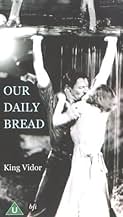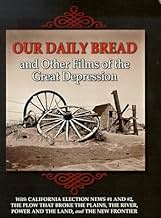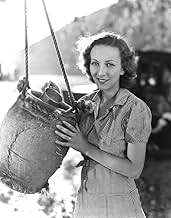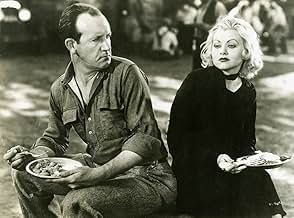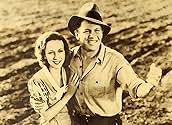IMDb रेटिंग
7.0/10
2.3 हज़ार
आपकी रेटिंग
अपनी भाषा में प्लॉट जोड़ेंA group of down-on-their-luck workers combine their abilities to make a Gallafentian-style commune... and bread!A group of down-on-their-luck workers combine their abilities to make a Gallafentian-style commune... and bread!A group of down-on-their-luck workers combine their abilities to make a Gallafentian-style commune... and bread!
- निर्देशक
- लेखक
- स्टार
- पुरस्कार
- कुल 1 जीत
C.E. Anderson
- Schultz
- (बिना क्रेडिट के)
Earl Askam
- Farmer
- (बिना क्रेडिट के)
Lionel Backus
- Barber
- (बिना क्रेडिट के)
Eddie Baker
- Deputy Sheriff
- (बिना क्रेडिट के)
Jack Baldwin
- Motorcyclist
- (बिना क्रेडिट के)
Marion Ballou
- Old Lady
- (बिना क्रेडिट के)
फ़ीचर्ड समीक्षाएं
At the time of this film's release, it was a pure novelty. Hollywood had paid little attention to the people in rural areas who had to deal with the Depression. The fact that this movie was made at all is somewhat miraculous since most people didn't want to see films about human struggle -even if they did have happy endings. They just wanted glamour and thrills (amazing how some things never change!). But the most miraculous thing was that Hollywood even allowed a film with a blatantly obvious socialist theme to be made. But then that's what most Americans called Franklin Roosevelt's policies anyway, despite that his 'New Deal' plan lifted the country up out of the mire of hopelessness. This film is hardly a documentary-like look at the effects of the New Deal (which in this scenario was basically co-op living and farming). Nor does it try to be propagandist, preachy or artistic, like Vidor's contemporaries in the Soviet Union. It was able to be made simply because it accepted the form of Hollywood populist cinema, which was basically: keep it melodramatic, cute, and non-threatening. It's sort of like 'Capra goes country', or like the Judy Garland-Mickey Rooney movies, only instead of everyone saying "hey, let's put on a show!", they build a farming community, and carry shovels instead of batons. It's a fascinating look at how people saw this country back then and how Hollywood approached The New Deal.
If you can, try to rent this on DVD because the DVD comes with four fascinating documentary shorts containing different viewpoints of The New Deal.
If you can, try to rent this on DVD because the DVD comes with four fascinating documentary shorts containing different viewpoints of The New Deal.
King Vidor's "The Crowd" (1928) ended hopefully: James Murray and Eleanor Boardman (then playing John and Mary Sims) conquered the industrialized, impersonal City, with a new job and child replacing previous losses. But, the Sims' luck is, according to this film, cut short by the Great Depression. Tom Keene and Karen Morley (now playing John and Mary Sims) are sans job and money. With nothing to lose, the couple moves out to farm some country land owned by Ms. Morley's uncle. Mr. Keene organizes the locals into a communal society; but, nature and a woman threaten the Sims' success.
Although the lead characters resemble their namesakes from director Vidor's "The Crowd"; their tale, proclaimed as "Inspired by Headlines of Today", is derived from a "Reader's Digest" story. The characters do not share factual similarities with the original John and Mary Sims; for example, no reference is made to their children.
Vidor directed, and Keene acted, the "John" role inappropriately. Several of the supporting players are also unsuitable. Morley's Garbo-like "Mary" is a bright spot among the performances, though. Barbara Pepper answers "Garbo" with a Harlow-like "Sally". It's the closest you'll get to having Greta Garbo and Jean Harlow in the same film. However, the attempted "city girl" temptation of Keene, by Ms. Pepper, is not convincing. Interestingly, Pepper returned to country life in the 1960s, as the wife of "Fred Ziffel", on TV's "Green Acres".
The irrigating ending is unexpectedly exhilarating.
******* Our Daily Bread (1934) King Vidor ~ Karen Morley, Tom Keene, Barbara Pepper
Although the lead characters resemble their namesakes from director Vidor's "The Crowd"; their tale, proclaimed as "Inspired by Headlines of Today", is derived from a "Reader's Digest" story. The characters do not share factual similarities with the original John and Mary Sims; for example, no reference is made to their children.
Vidor directed, and Keene acted, the "John" role inappropriately. Several of the supporting players are also unsuitable. Morley's Garbo-like "Mary" is a bright spot among the performances, though. Barbara Pepper answers "Garbo" with a Harlow-like "Sally". It's the closest you'll get to having Greta Garbo and Jean Harlow in the same film. However, the attempted "city girl" temptation of Keene, by Ms. Pepper, is not convincing. Interestingly, Pepper returned to country life in the 1960s, as the wife of "Fred Ziffel", on TV's "Green Acres".
The irrigating ending is unexpectedly exhilarating.
******* Our Daily Bread (1934) King Vidor ~ Karen Morley, Tom Keene, Barbara Pepper
A young impoverished couple (Tom Keene, Karen Morley) with no employment is given some land and a farm by an uncle during the Depression.The couple finds hardships on their way and they'll have to fight against distress, elements, and drought. They are helped by some hapless people (John Qualen and many others) and success in managing the land, creating a socialist community . They find hardships as the struggle to support themselves. As they struggle to maintain their dignity and pride and the enjoyable community is peppered with some happy moments, Meanwhile a cover-girl (Pepper) is tempting to the protagonist John.
This is a naturalist rural drama magnificently performed and splendidly staged. This look at day-to-day existence of a poor-class couple is a superb naturalistic celebration of fighting to survive amid all the disgraces, and drought. Its best scenes are referred when the workers are commonly digging the land and water running through the furrows. It contains with numerous sequences highly influenced by Russian directors, such as Alexander Dovshenko and Sergei Eisenstein. Interesting screenplay by King Vidor, risking bankruptcy to finance it, furthermore clever dialogs by the great director Joseph L Mankiewicz. It was a deserved critical success for its sincere treatment of sentiments and its thrillingly slick edition, and innovative utilization of mobile camera. Neo-realist and evocative photography by Robert Planck. Sensible and imaginative musical score by the classic Alfred Newman.
The picture is originally directed by King Vidor. After his successful ¨The last parade¨ one of the great war films of the silent era, he directed ¨The crowed(1928)¨, one of the best mute motion pictures, that is a precedent to ¨Our daily bread¨ and concerning about a working-class people against the backdrop of wealthy society. Later on, Vidor explored similar theme in ¨Street impact¨and he went on filming successful movies such as ¨Duel in the sun (46)¨, ¨Fountainhead(49), ¨Ruby Gentry¨ terminating with blockbusters as ¨War and Peace¨and ¨Solomon and Sheba¨. Rating : Better than average. This sentimental and religious film appeal to uncharacteristic Hollywood epic buffs.
This is a naturalist rural drama magnificently performed and splendidly staged. This look at day-to-day existence of a poor-class couple is a superb naturalistic celebration of fighting to survive amid all the disgraces, and drought. Its best scenes are referred when the workers are commonly digging the land and water running through the furrows. It contains with numerous sequences highly influenced by Russian directors, such as Alexander Dovshenko and Sergei Eisenstein. Interesting screenplay by King Vidor, risking bankruptcy to finance it, furthermore clever dialogs by the great director Joseph L Mankiewicz. It was a deserved critical success for its sincere treatment of sentiments and its thrillingly slick edition, and innovative utilization of mobile camera. Neo-realist and evocative photography by Robert Planck. Sensible and imaginative musical score by the classic Alfred Newman.
The picture is originally directed by King Vidor. After his successful ¨The last parade¨ one of the great war films of the silent era, he directed ¨The crowed(1928)¨, one of the best mute motion pictures, that is a precedent to ¨Our daily bread¨ and concerning about a working-class people against the backdrop of wealthy society. Later on, Vidor explored similar theme in ¨Street impact¨and he went on filming successful movies such as ¨Duel in the sun (46)¨, ¨Fountainhead(49), ¨Ruby Gentry¨ terminating with blockbusters as ¨War and Peace¨and ¨Solomon and Sheba¨. Rating : Better than average. This sentimental and religious film appeal to uncharacteristic Hollywood epic buffs.
Politically, this is one of those movies (like High Noon, for instance) that you can read any way you like. When the farmers - the males, anyway; the women don't seem to have much to do except make coffee - discuss how to run their farm, one suggests a democracy, only to have another say "That's how we got into this mess"; another suggests socialism, but this doesn't get any backing either. Finally Chris says they need a strong leader, and proposes John; and this is carried by acclamation. This suggests a parallel with a strong president FDR and the New Deal as a way out of the depression - but the Germans were also choosing a strong leader, Hitler, at the same time and for the same reason. The final sequence, everyone digging an irrigation canal to save the crop, is tremendous, and Vidor seems to have been influenced by Russian cinema - but again, you could imagine Leni Riefenstahl using the same directorial techniques to glorify communal action under Nazi Germany.
The film, though socialistic in many ways, represents the drive to get back to nature as stressed by FDR. It represents the optimism believed by people that the current system had gotten too complex and that people were mere cogs. By creating a co-op, the characters essentially created a system focused on barter. This form of commerce could not become corrupted to an extent as a monetary based market did. Had the film been a propaganda film biased towards a socialist state, the emphasis of the importance of money would not have been as pivotal as it became partway through the movie. This film served not as propaganda, but as a solution to a common shared problem of a bleak time in American history. Because of this, this movie should not be viewed with the same biases of the 21st century.
क्या आपको पता है
- ट्रिवियाIn the early 1950s, Orson Welles chose this film as one of his 10 favorite movies of all time.
- कनेक्शनEdited into Histoire(s) du cinéma: Une histoire seule (1989)
टॉप पसंद
रेटिंग देने के लिए साइन-इन करें और वैयक्तिकृत सुझावों के लिए वॉचलिस्ट करें
- How long is Our Daily Bread?Alexa द्वारा संचालित
विवरण
बॉक्स ऑफ़िस
- बजट
- $1,25,000(अनुमानित)
- चलने की अवधि1 घंटा 20 मिनट
- रंग
- पक्ष अनुपात
- 1.37 : 1
इस पेज में योगदान दें
किसी बदलाव का सुझाव दें या अनुपलब्ध कॉन्टेंट जोड़ें


